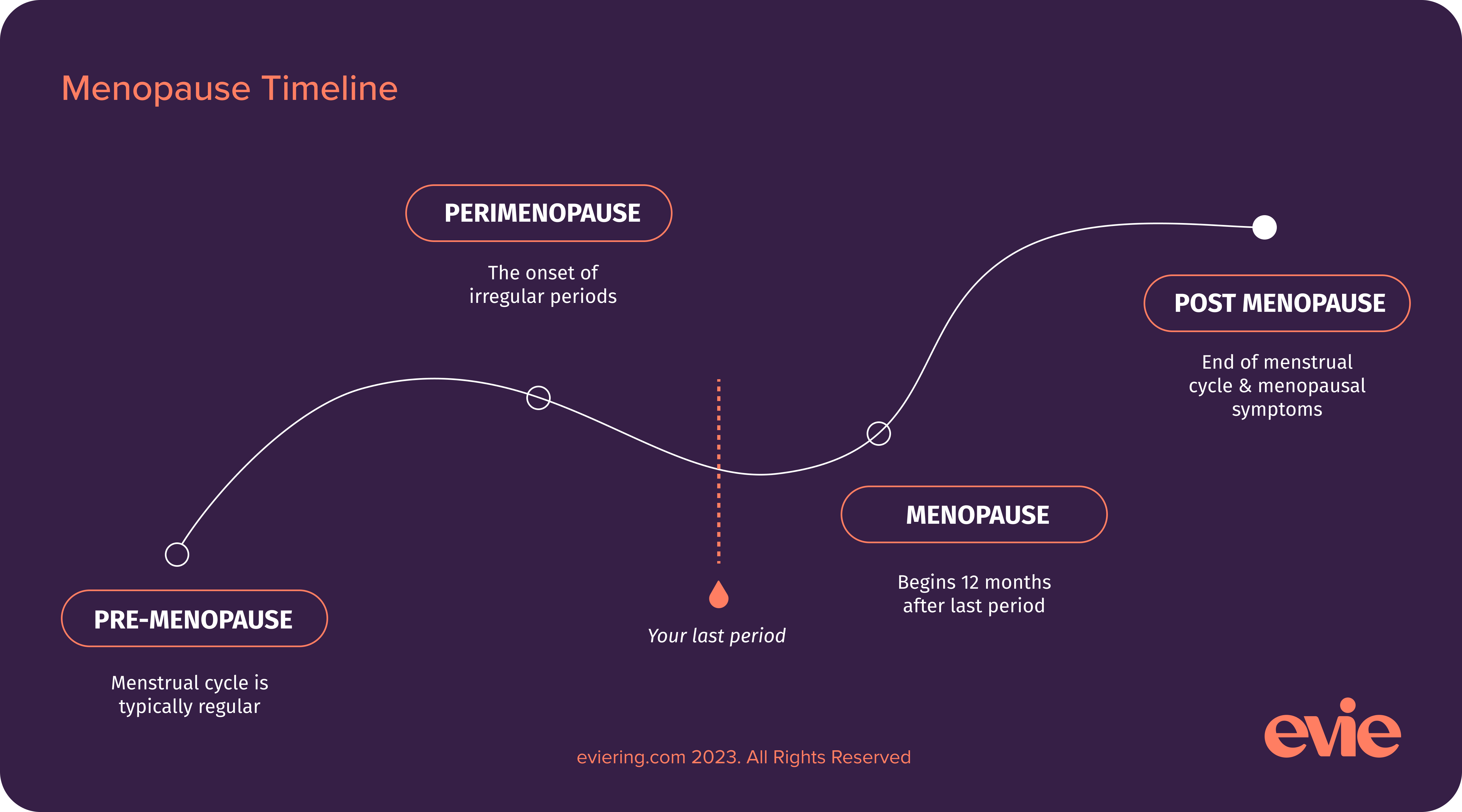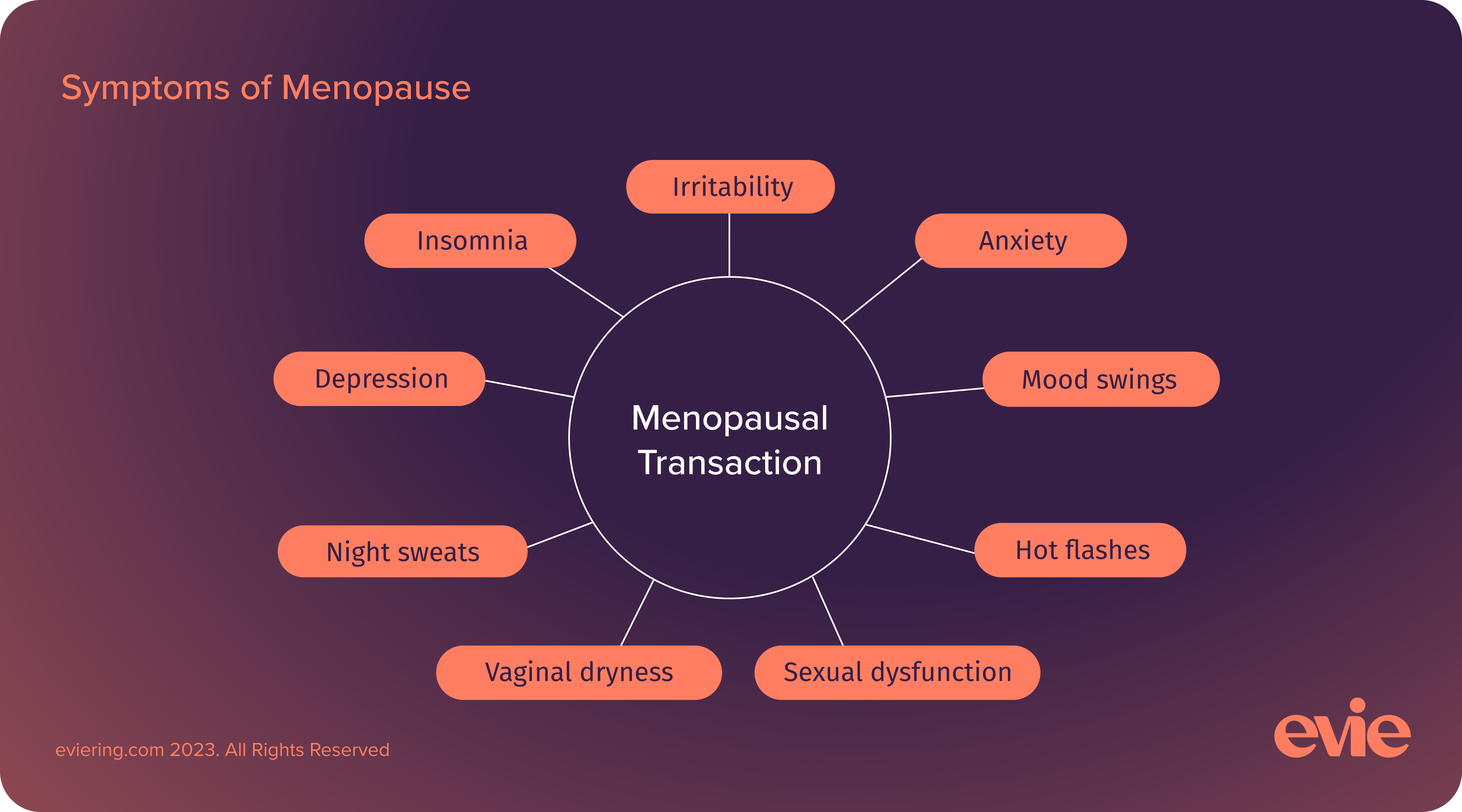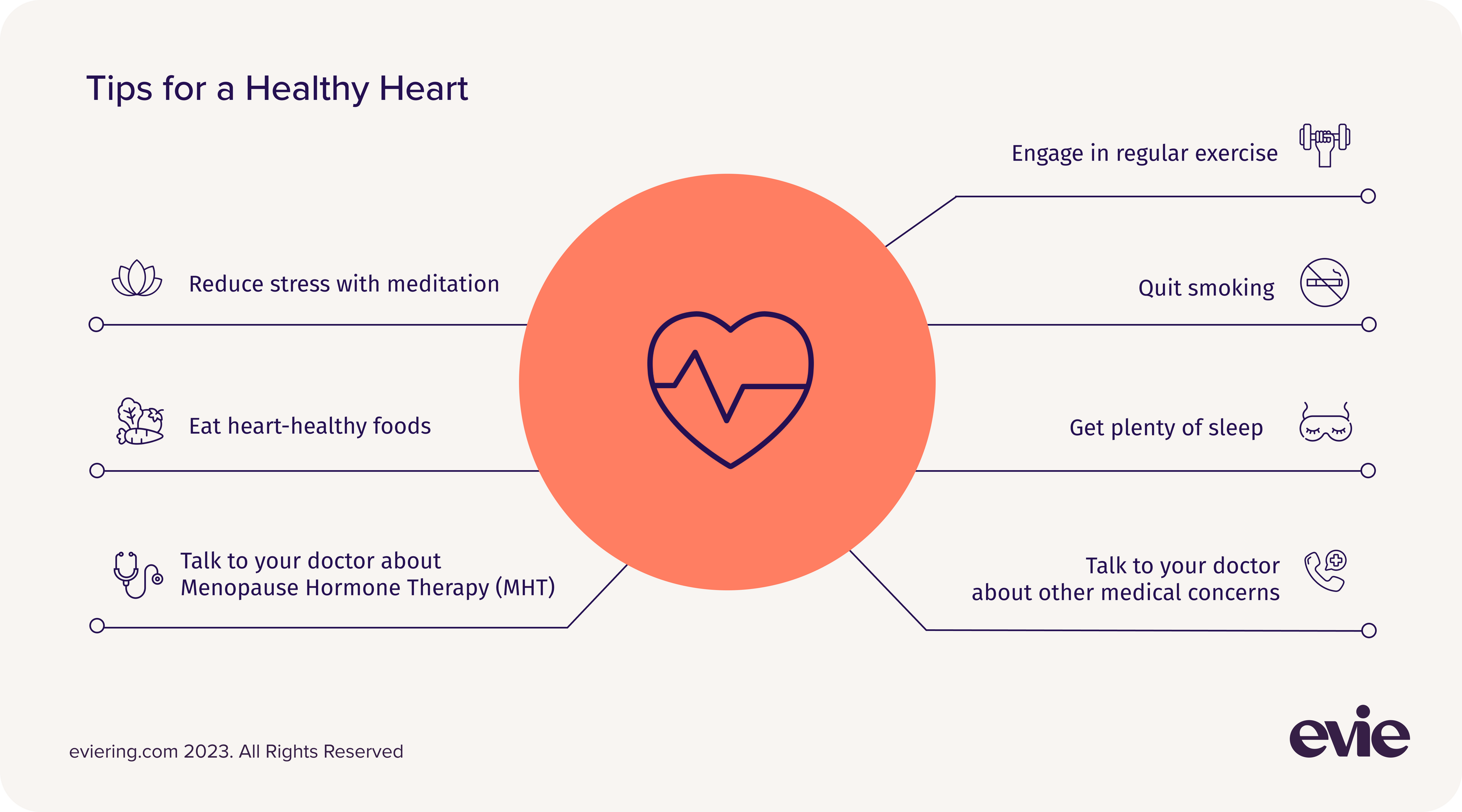A natural transition in every woman’s life, menopause marks the end of your reproductive cycle and brings with it a host of changes, both expected and unexpected. Understandably, this can lead to feelings of uncertainty and even fear, but with the right education and information, you can manage the change with confidence and compassion.
Like any transition, there are new developments that are important to acknowledge —particularly the ones that impact your heart health. However with small changes in your daily routine, you can prioritize your heart health and protect it through menopause. 1
What Is Menopause?

You enter menopause after 12 months without a period. Your ovaries stop releasing eggs and your body produces less of the hormone estrogen. This transition away from your reproductive years happens to most women around your late 40s or early 50s. But it doesn’t happen overnight. Before you begin menopause your body goes through several changes in a period called perimenopause.
Both perimenopause and menopause can come with uncomfortable symptoms like hot flashes, fatigue, vaginal dryness, poor concentration, and more. 1 85% of women experience one or a few of these symptoms.16 The experience of these symptoms varies from person to person and could last anywhere from a few years to a full decade. 2 Your body is adjusting to your changing hormone levels, but this adjustment period doesn’t last forever. As you enter your postmenopausal years, most women experience fewer symptoms.

Does Menopause Affect Your Heart Health?
Most women are fairly familiar with these more talked-about menopausal symptoms. But a lesser-known symptom of menopause is the impact it could have on your heart health. 3 Here’s how:
Elevated Cholesterol Levels & Heart Disease Risk
Heart disease is the leading cause of death for women in the United States, impacting about 1 in every 5 women. 4 And although everyone’s risk of heart disease increases as they age, that risk increases dramatically during menopause.5 In fact, half of all deaths in women over the age of 50 are a result of some form of cardiovascular disease.5
Why is that? During menopause, your body naturally reduces your estrogen hormone production. Estrogen plays a key role in protecting your heart and blood vessels.2 This is why a reduction can increase your LDL (bad cholesterol), decrease HDL (good cholesterol), and make your arteries more susceptible to fatty build-up.6 This puts you at a greater risk of heart disease, especially if you’re entering menopause before the age of 45 where you’re experiencing a much longer period of low estrogen. 2 6
Heart Palpitations
Many women also experience an elevated heart rate during menopause, or the feeling that their heart is beating faster than usual or with more irregularity. 3 These heart palpitations are a common symptom of menopause, affecting up to 47% of women. 7 They don’t usually last more than a few seconds and are often harmless, but they can feel worrisome, especially when your heart palpitations last longer than a few seconds. 2
For most women, these heart palpitations aren’t any indication of a serious problem. The rapid decline in estrogen and progesterone you’re experiencing during perimenopause and menopause can lead to an overstimulation of the heart. 1 Hence the feeling like it’s beating out of your chest.
However, even if it’s “normal” that doesn’t make them feel any less alarming. There is very little research we have on them, likely resulting from gender bias in healthcare that downplays the severity of women’s symptoms.8 Although it’s not entirely clear what causes them or how to make them go away, there are a few things you can do to help.
7 Tips for Reducing Heart Disease Risk and Heart Palpitations
So how can you better take care of your heart during menopause to ease these heart palpitations and reduce your cardiovascular disease risk?
1. Reduce Stress With Meditation
Stress can impact your physical health in many ways, and your heart is one of them. The more stress you experience, the more pressure you place on your heart. Researchers have found that women were more likely to experience distressing heart palpitations if they were also experiencing higher levels of stress, insomnia, or depression. 8 And stress weighs heavily on your heart, increasing your risk of a heart attack, stroke, or heart disease.9
Eliminating stress isn’t exactly possible. But there are activities like yoga, meditation, and breathing exercises that can help lower your stress levels. And if your stress feels unmanageable on your own, schedule time with your doctor to discuss options for medication or therapy. 3
2. Talk to Your Doctor About Menopause Hormone Therapy (MHT)
Menopause hormone therapy (MHT), also known as hormone replacement therapy, is a treatment that is commonly understood to replace the hormones estrogen or estrogen and progesterone during perimenopause and menopause. This could help alleviate certain menopausal symptoms like hot flashes, heart palpitations, and more.10
This kind of treatment is often recommended for women who are experiencing early menopause (before the age of 45) or who’ve had a hysterectomy. The sudden and early decline of estrogen increases your risk of several health conditions like heart disease, stroke, and osteoporosis.10 Menopause hormone therapy could help mitigate that decline and protect your heart in the process. 2 However, there are risks associated with this treatment option.6 So make sure to speak with your doctor about whether the benefits outweigh the risks for your personal health situation. 10
3. Eat Heart-Healthy Foods
You can’t take care of your heart if you’re not giving it the proper fuel it needs to thrive. This includes adding heart-healthy foods to your diet such as:11 12
- Fruits (like apples, bananas, blueberries, oranges, pears, and grapes)
- Vegetables (like spinach, collard greens, kale, cabbage, broccoli, and carrots)
- Healthy fats (like fish, avocados, olives, nuts, seeds, and nut butter)
- Low-fat protein (like turkey, chicken, fish, eggs, nuts, seeds, and soy)
- Whole grains (like oatmeal, brown rice, and whole-grain bread)
- Legumes (like beans, peas, and lentils)
- And plenty of fiber (like raspberries, pears, apples with the skin, bananas, green peas, broccoli, barley, lentils, and beans)
It also means avoiding foods that put extra strain on your heart like sodium, saturated fats, trans fats, added sugars, and alcohol.12 Make sure you’re also drinking plenty of water to avoid dehydration.3
4. Engage in Regular Exercise
According to the Physical Activity Guidelines for Americans, adults need 150 minutes of moderate-intensity cardio and 2 days of strength-training activity each week.14
Although exercise demands a lot from your heart, this kind of stress is good for you. Just like any other muscle, the heart needs exercise to stay healthy.5 When going for a run, lifting weights, or flowing through a yoga class, your heart and lungs are working harder than usual to take in and circulate oxygen and blood throughout your body. And the stronger your heart gets, the more efficiently it can do its job. This helps support your health in a myriad of ways, including lowering your heart rate and blood pressure, easing heart palpitations, and reducing your risk for stroke, heart disease, and several other health complications.13
5. Quit Smoking
Smokers are more than twice as likely to suffer from a heart attack than non-smokers.5 11 And the nicotine in your cigarette can also make heart palpitations worse.3 Luckily, quitting can make a big difference, even if you’ve been smoking for a long time. Your risk of heart disease and heart palpitations will drop significantly if you can quit smoking. 11
6. Get Plenty of Sleep
Sleep (or lack thereof) impacts every aspect of your health, including your heart. Insomnia and poor sleep quality can make heart palpitations worse or more frequent. And lack of sleep can increase your risk for a wide range of health complications, including heart disease.3
Aim for 7 to 8 hours each night. 17 To improve your sleep quantity and quality there are a few things you can do to help:
- Stick to a regular sleep schedule
- Eliminate screens before bed
- Practice meditation
- Get into a regular nighttime routine that prepares your body for bed
- Don’t use your bed for anything other than sleep and sex
- Avoid caffeine or sugar close to bedtime
- Exercise or stay active during the day
7. Talk to Your Doctor About Other Medical Concerns
Menopause isn’t the only risk factor for heart disease. Other factors could elevate your risk including: 5
- Diabetes
- High blood pressure
- High cholesterol
- Obesity
- Family history of heart disease
- Poor diet or a sedentary lifestyle
If you fall into any of these categories it’s important to talk to your doctor about the right steps to treat and manage your health condition(s) so you can reduce your risk for heart disease and stay healthy long-term.
When to See a Doctor
Although historically we’ve dismissed menopausal symptoms as par for the course in a middle-aged woman’s life, that doesn’t mean you need to just deal with the symptoms you’re experiencing.3 And given your elevated health risks during this period, it’s more important than ever to make sure you’re regularly checking in with your doctor. 15 They can identify and implement strategies to lower your cardiovascular risk and help ease any painful or uncomfortable menopausal symptoms you’re experiencing.
This is especially the case when it comes to heart palpitations. Although they might be a common symptom during menopause, that doesn’t mean you should ignore them completely. If you experience them often, for long periods, or just want clarification on what’s healthy, it’s worth mentioning these heart palpitations to your doctor. They can offer guidance on how to help. They can also monitor the electrical signals in your heart to check for any abnormalities that might signal a more serious issue.8
The Takeaway
Menopausal women are in one of the highest risk categories for heart disease and nearly 50% of women will experience heart palpitations during menopause. In other words, this can be a difficult time for your heart.
However, there are lifestyle changes you can make like cutting down on caffeine, engaging in regular exercise, eating heart-healthy foods, and getting plenty of sleep that can help. There are also options like menopause hormone therapy. But the biggest takeaway of them all is that whether you’re experiencing these heart-related effects or not, this is an important time of your life to check in with your doctor.
Sources:
- Franks, I. (2022, January 31). Heart palpitations and menopause: What you need to know. https://www.medicalnewstoday.com/articles/317700
- Newson, L. (2022, October). Menopause and your heart. British Heart Foundation. Retrieved April 13, 2023, from https://www.bhf.org.uk/informationsupport/heart-matters-magazine/medical/women/menopause-and-your-heart
- Smith, J. (2022, September 27). Heart palpitations in menopause: What you need to know. Mindset Health. Retrieved April 13, 2023, from https://www.mindsethealth.com/matter/heart-palpitations-in-menopause-what-you-need-to-know
- U.S. Department of Health & Human Services. (2023, February 3). Lower Your Risk for the Number 1 Killer of Women. Centers for Disease Control and Prevention. Retrieved April 13, 2023, from https://www.cdc.gov/healthequity/features/heartdisease/index.html
- Begum, J. (2021, October 18). Menopause and Heart Disease. WebMD. Retrieved April 13, 2023, from https://www.webmd.com/menopause/guide/menopause-heart-disease
- Menopause and the Cardiovascular System. (2023, January 5). Johns Hopkins Medicine. Retrieved April 13, 2023, from https://www.hopkinsmedicine.org/health/conditions-and-diseases/menopause-and-the-cardiovascular-system
- Sievert, L. L., & Obermeyer, C. M. (2012). Symptom clusters at midlife. Menopause, 19(2), 133–144. https://doi.org/10.1097/gme.0b013e3182292af3
- Upham, B. (2020, December 22). Menopausal Heart Palpitations Can Cause Distress, May Signal Serious Health Issue. EverydayHealth.com. https://www.everydayhealth.com/menopause/menopausal-heart-palpitations-can-cause-distress-may-signal-serious-health-issue/
- Stress and heart disease. (2020, June 4). British Heart Foundation. Retrieved April 13, 2023, from https://www.bhf.org.uk/informationsupport/heart-matters-magazine/news/behind-the-headlines/stress-and-heart-disease
- Hormone therapy: Is it right for you? (2022, December 6). Mayo Clinic. Retrieved April 5, 2023, from https://www.mayoclinic.org/diseases-conditions/menopause/in-depth/hormone-therapy/art-20046372
- Keeping Your Heart Healthy at Menopause. (n.d.). The North American Menopause Society, NAMS. Retrieved April 13, 2023, from https://www.menopause.org/for-women/menopauseflashes/bone-health-and-heart-health/keeping-your-heart-healthy-at-menopause
- Choose Heart-Healthy Foods. (2022, March 24). National Heart, Lung, and Blood Institute. Retrieved April 13, 2023, from https://www.nhlbi.nih.gov/health/heart-healthy-living/healthy-foods
- Aerobic exercise: Top 10 reasons to get physical. (2022, February 17). Mayo Clinic. https://www.mayoclinic.org/healthy-lifestyle/fitness/in-depth/aerobic-exercise/art-20045541
- How much physical activity do adults need? (2022, June 2). Centers for Disease Control and Prevention. Retrieved April 13, 2023, from https://www.cdc.gov/physicalactivity/basics/adults/index.htm
- Khoudary, S. R. E., Aggarwal, B., Beckie, T. M., Hodis, H. N., Johnson, A., Langer, R., Limacher, M. C., Manson, J. E., Stefanick, M. L., & Allison, M. A. (2020). Menopause Transition and Cardiovascular Disease Risk: Implications for Timing of Early Prevention: A Scientific Statement From the American Heart Association. Circulation, 142(25). https://doi.org/10.1161/cir.0000000000000912
- Grant MD, Marbella A, Wang AT, et al. Menopausal Symptoms: Comparative Effectiveness of Therapies [Internet]. Rockville (MD): Agency for Healthcare Research and Quality (US); 2015 Mar. (Comparative Effectiveness Reviews, No. 147.) Introduction.
- Seven or more hours of sleep per night: A health necessity for adults (2017, November 7). American Academy of Sleep Medicine – Association for Sleep Clinicians and Researchers. Retrieved October 3, 2023 from: https://aasm.org/seven-or-more-hours-of-sleep-per-night-a-health-necessity-for-adults/



